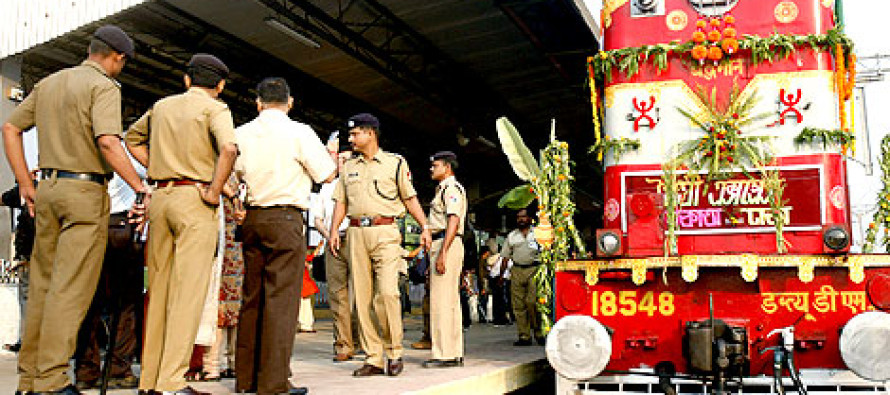‘Peace train’ between Dhaka and Kolkata: A new era of relationship?

The opening of the passenger train service on 14th April on Bengali New Year’s day between Dhaka and Kolkata, has ended the 43 year hiatus in Dhaka-Kolkata rail link. The passenger train that was introduced during the British days was snapped in March 1965 due to India-Pakistan war.
What a historic moment now: More than 40 years later this service has finally been revived. The first Friendship Train from Dhaka to Calcutta was filled with more than 400 passengers.
Bangladesh Tourist Corporation made preparations to welcome the passengers from Kolkata through dance, songs and sprinkling of petals. Some Indian journalists were reportedly overwhelmed with such welcome on the soil of Bangladesh.
The two countries already had connection by bus and air, but the meaning of this renewed passenger train service has its own importance. The inaugural day was the same day as the Bengali New Year’s day, 14th April. It was a deliberate choice.
An agreement for running the passenger train was concluded on 12 July 2001. After two trials, the two countries agreed to the technical feasibility of commencement of the passenger train service within a short of time.
During the past- immediate government, the project was kept in hibernation and it was revived under the care-taker government in March 2007.
Bilateral relations are the sum of the many ways individuals and institutions, public and private manage relations between Bangladesh and India.
One of the important efforts is the communication link between peoples of the two countries. The renewed passenger train service is one of the crucial tasks in achieving movement of people of both countries.
The passenger train service means a lot to citizens of both nations. It symbolises peace and harmony. It gives hope for a new relationship and shows the growing esteem for each other. It demonstrates reinforced relationship with each other on the basis of trust and confidence.
The idea of developing a regional motor vehicle agreement that was mooted at the 14th SAARC summit held in New Delhi last year has been in progress and a meeting among SAARC countries would be held this year.
The sooner a regional multi-modal system is agreed upon, the better is for the region in terms of peace, economic growth and development.
All South Asian countries must make commitment to making the travel freer and easier. Immigration and customs are to be conducted among the passengers in the train as they do in Europe. The Orient Express runs from Singapore to Bangkok via Kuala Lumpur and it has been a smooth service without any hassle. If others can do it, why can’t we?
It is noted that China has built a rail road link to Lhasa (Tibet) from Beijing and eventually the rail link is to be connected with Kathmandu. China is also building a 2, 000 kilometres of 6-lanes road from Kunming, capital China’s southwestern Yunnan province to Bangkok.
If Bangladesh and India are connected with means of multimodal transport, it will offer a great opportunity for both countries to be able to link with China’s railroad in the north and roads in the south.
South Asia will flourish most when connected to itself and the rest of South Asian countries. The train service demonstrates the importance of interconnectivity between the two neighbours.
.Economic globalization has made it compelling that both countries must seriously consider in integrating their economy first within the two countries, and then with the region including South East Asia and China.
There is a saying that ‘money makes the world go round’. For commercial purposes, the boundaries that separate one state from another are no more real than the equator. They do not define business requirements or consumer trends. Global business has changed the pattern of economic relationship.
Interconnectivity between peoples of both countries is the basic building block of globalization.
In this context, two new lines of communication may be considered to be opened between the two countries:
(a) The demand of Bangladesh TV cable operators to allow screening their shows in West Bengal should be considered by Indian authorities. The acceptance of the
demand is long overdue because in Bangladesh, as Indian cable TV shows are permitted to be watched by Bangladeshis.
(b)Newspapers of each country may be available to readers of both countries. Such facility will go a long way in creating mutual trust and confidence among peoples of the two neighbouring nations.
The opening of the passenger train service may act as catalyst in boosting close and cooperative relations between the two countries, in gradually achieving inter-connectivity within and outside the region.
Let me finally conclude about the implication of the passenger train in people’s minds: It has brought joy, peace, harmony, and hope at a moment of great opportunity of bilateral relations.
By Harun ur Rashid
Former Bangladesh Ambassador to the UN, Geneva.


